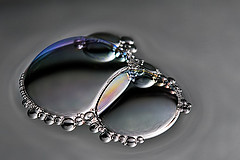
 As we consider ways to live healthier and reduce our risk of cancer, we need to be aware of chemicals that act as “hormone disruptors.” These are synthetic ingredients that we’re exposed to in various personal-care and household products that can interfere with the natural hormone systems in our bodies, potentially causing cancer.
As we consider ways to live healthier and reduce our risk of cancer, we need to be aware of chemicals that act as “hormone disruptors.” These are synthetic ingredients that we’re exposed to in various personal-care and household products that can interfere with the natural hormone systems in our bodies, potentially causing cancer.
Hormone disruptors imitate our real hormones, so the body is “fooled” into thinking they’re the same thing.
The toxins can then bind to the same sites as natural hormones do, altering normal function. Circulating around in the blood stream like tourists, they look for certain “target” cells. When they find the right one, they attach and activate that cell to start a certain function. The cell can then operate like a robot gone wrong, dividing more than it should and incorrectly activating genes.
“Each time they divide, they have the risk of copying DNA incorrectly and creating mutations in key genes,” says Suzanne Snedeker, Ph.D., “which may lead to increased breast cancer risk.” Suzanne is talking specifically about synthetic chemicals that mimic estrogen, a female hormone, and cause it to abnormally multiply. Research shows that other hormone disruptors can cause problems like other cancers, thyroid disorders, diabetes, and behavioral abnormalities in children.
The best way to protect yourself is to limit your exposure to the products that carry these toxins. We’ve put together a partial list here to get you started.
• Pesticides. Many are known to have hormone-disrupting effects. Buy organic and locally grown food. Avoid pesticide use, and peel non-organic produce.
• Plastics. May contain phthalates, known to be hormone disruptors. Microwave foods in ceramic or glass containers (instead of plastic). Avoid plastic cling wrap on food-cover with a paper-towel instead. Give children toys made of more natural materials. Use a stainless steel bottle for water rather than buying plastic bottled water.
• Mercury. Limit your consumption of tuna and other high-mercury fish to one-two times a week, less if you’re pregnant. Ask your dentist for porcelain fillings instead of mercury.
• Detergents. May contain chemicals that are hormone disruptors. Avoid “super-strength” cleaners and purchase organic or natural laundry detergents.
• Shampoos & Conditioners. These often contain parabens, which have been linked with breast tumors. Read labels, and choose non-toxic products like Avalon and Jason hair products.
• Liquid Soaps. Many contain “triclosan,” an antibacterial agent that’s been linked to hormone disruption in animals. Choose organic or natural brands like Burt’s Bees.
• Lotions. Believe it or not, many have the same dangerous phthalates that are found in plastics, which have been linked with damaged sexual development in baby boys. Look for chemical names like DBP, DEP, and DEHP. Choose organic and natural lotions-check the Skin Deep Database for your favorite formulas.
• Sunscreens. Some contain chemicals like 4-Methyl-Benzylidencamphor (4-MBC), Oxybenzone, Benzophenone-3, and Octyl-methoyl-cinnamates (OMC), which can act as hormone disruptors. Look for more natural formulas with titles that include words like “organic,” “chemical-free” and “sensitive.”
Have you changed your purchasing habits to reduce exposure to hormone disruptors? Please share your experience.
Photo courtesy of moonwell via Flickr.com.

